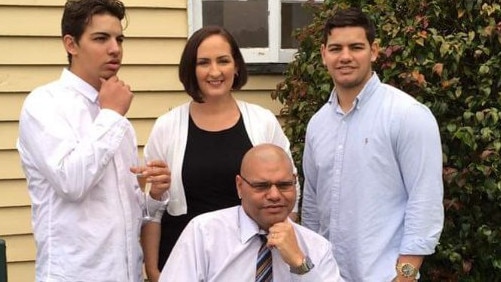Two years, two leg amputations: Ipswich father-of-six told he can work
A Redbank Plains father-of-six who had both legs amputated after two rare medical episodes in two years has been rejected for a disability support pension. Here’s why.
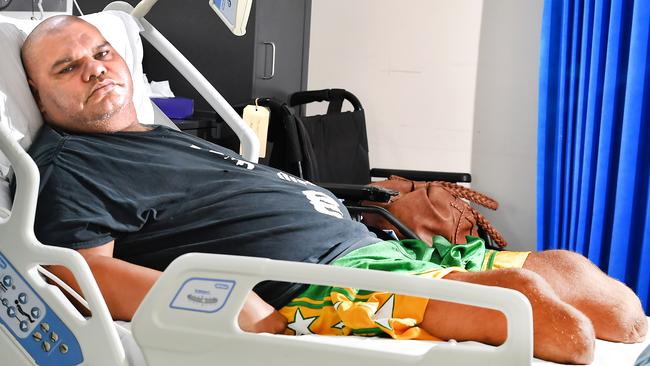
Community News
Don't miss out on the headlines from Community News. Followed categories will be added to My News.
After two unrelated infections left Redbank Plains father-of-six Aaron Drahm a double amputee, he has been dealt another blow after being told he was not eligible to receive a disability pension because he can still work.
Mr Drahm’s application for a pension was rejected by Centrelink three times, forcing the family to turn to crowd-funding for a new disability-modified vehicle after their car stopped working late last year.
The problems began in 2017 when the former Ipswich girls basketball coach and residential care worker kicked a drum stool in his laundry, causing a small cut between two of his toes.
Days later, on his second-youngest child's first birthday, Mr Drahm began to feel feverish, without energy and nauseous.
By the next day he could barely move.
His long-term partner, Latecha Crimean, urged him to see a doctor who referred Mr Drahm immediately to Ipswich Hospital.
Doctors at the hospital told him he had developed septicaemia, a severe blood infection.
Initially, doctors removed nearly a quarter of Mr Drahm’s right foot.
But the infection continued and they were forced to remove more and more tissue until eventually offering him the option of an amputation below the knee.
“They said the infection was in my blood and it had gotten that bad that if I had closed my eyes that day, I wouldn‘t have woken up,” he said.
The once active sportsman was left reeling at the news.
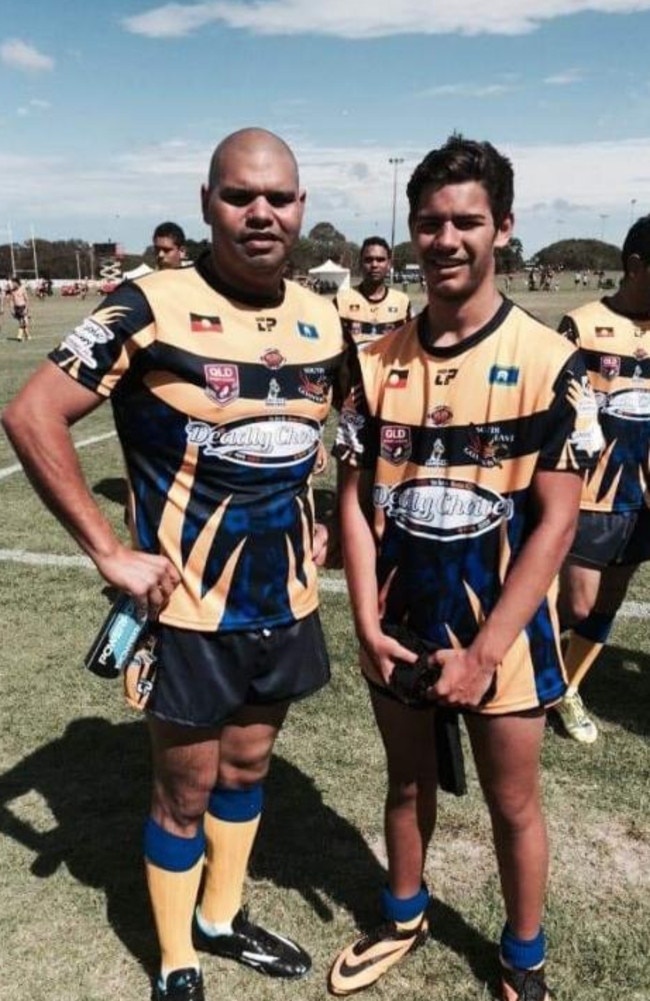
He started coaching again from his wheelchair, received a prosthetic leg and learned to walk again.
His partner had to overcome extreme anxiety about driving and get a licence to transport him to medical appointments.
In 2019 tragedy struck the family yet again.
Mr Drahm travelled to Wynumm, where he grew up, just before Christmas and went for a swim with his children and sister in the Wynumm wading pool.
Several days later, his left foot started to swell but this time he immediately sought help.
“The doctor tested it and said he’d give me a call back sometime soon, but I wasn’t expecting it that day,” he said.
“Then four or five hours later he called me and said ‘mate you need to go to the hospital right now.’”
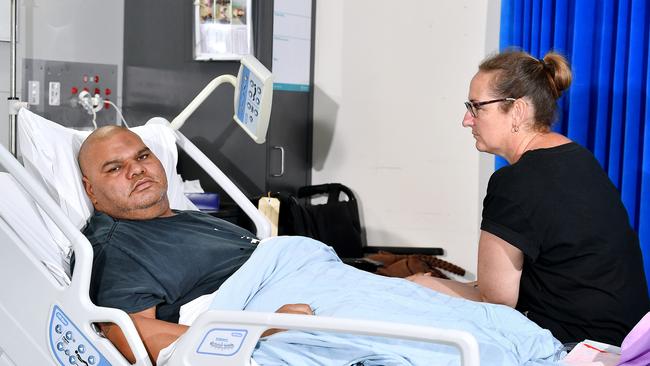
He was told he had contracted a rare flesh-eating disease, necrotizing fasciitis, which had created a gas pocket in his foot.
“They went in and cleaned it out and said they’d go in again in another couple of days,’’ he said.
“The surgeon said it did look all good, but he might just look under the skin up into the ankle before finishing up.
“The surgeon said it (the flesh in the ankle) looked like a zebra pattern.
“There was one part which looked fine and then more (necrotic tissue) and then another that looked fine and then more infection.”
The decision was made to amputate Mr Drahm’s left leg at the same point as his previous amputation.
“The feeling of that amputation was 10 times worse. I had just gotten into the safety net of normality in my life,” Mr Drahm said.
“I was up walking again, I had a new prosthetic, I had a water leg, I was about to get my sport leg.
“I had done so much to get that sports leg and I worked hard, lost weight and then this.”
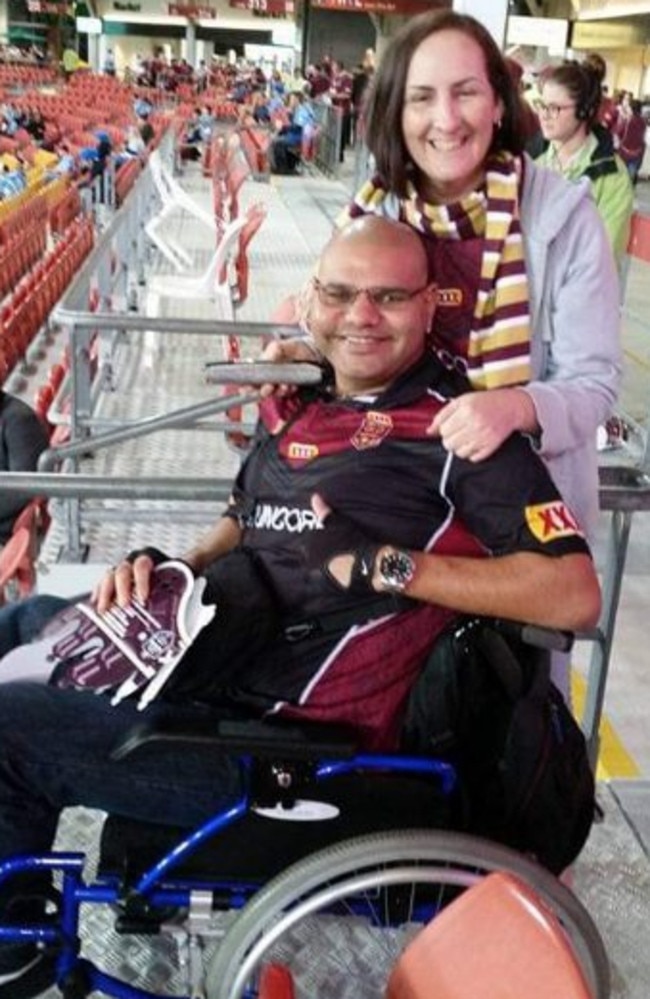
Mr Drahm and his family said while they were well supported through the NDIS, they had been left “high and dry’’ by Centrelink.
Staff told him he was ineligible for a disability support pension as he “could work if he wanted to”.
His family no has no income as Ms Crimean works as his full-time carer.
“We applied three times and in a way we gave up,’’ she said.
“We tried a couple times and then we didn’t want to put him through that again, especially with Aaron’s mental health the way it is.
“They were asking him all these questions and it felt like he had to prove himself to them.
“He was shaking the whole time and one of the staff just said ‘well, when I go for a job interview, I get shaky too’.”
“They (Centrelink) won’t acknowledge his mental health issues, but the NDIS did straight away.
“It’s taken us eight months of assessments and Aaron now has a formal diagnosis for his mental health, too.”
The Queensland Times contacted Services Australia for comment, and it is understood they have now contacted Aaron to resolve the issue.
Services Australia General Manager, Hank Jongen, also issued an apology for Mr Drahm’s treatment.
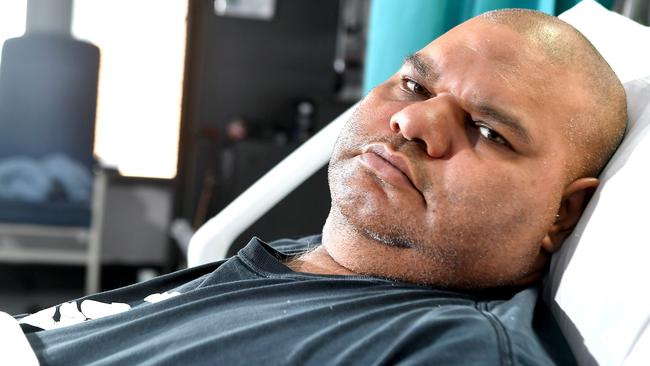
“We apologise for Mr Drahm’s experience in dealing with Services Australia when he needed help – this is not the way we want people to feel when they apply for assistance,” he said.
“While we can’t discuss individual cases, we are in contact with the family to ensure they receive all possible support and understand their options at this difficult time.”
Additionally, they have urged others facing similar circumstances to reach out for assistance.
“If people don’t agree with a decision we’ve made, they can ask for a formal review of the decision – including where they have additional information or evidence about their condition.
“We encourage anyone experiencing financial hardship to contact us, and we have social workers and specialist staff to assist people in vulnerable or complex circumstances.”
Mr Drahm was also recently diagnosed with renal failure and was told that due to a combination of prior health conditions as well as the medications used to treat these conditions, his kidneys were now functioning at just 8 per cent.
Yesterday (March 28), Mr Drahm underwent yet another operation to prepare him for the gruelling rounds of dialysis he now has to undertake.
“Aaron always thinks that there’s someone worse off than him … that’s really helped him,” Ms Crimean said.
“We have our grandson two days a week and he (Aaron) really looks forward to those.
“It fills his day with happiness … when they are together they are off in their own little world together.”
More Coverage
